Institutional Racism
Embedded in Systems
Unequal Access to Opportunity
Must and Can be Corrected
“Racism is a sin that constitutes a serious offence against God.”
Pope St. John Paul II, 2
All types of racism are “contrary to Christian faith and love”.
The Church and Racism, 33
What is Institutional Racism?
A Catholic Guide to Ending Systemic Injustice
Institutional racism is the embedding of racial inequity into the policies, practices, and norms of institutions—whether by design, neglect, or inertia—resulting in systemic disadvantage for racial minorities, even absent individual prejudice.
Institutional, or structural, racism is not necessarily intentional.
In essence, institutional racism is about power imbalances baked into societal frameworks, producing unequal results.
“Racism is a virus that quickly mutates and, instead of disappearing, goes into hiding, and lurks in waiting.”
Pope Francis, 20
Key Characteristics
Embedded in Systems: It is rooted in the way organizations (like governments, schools, businesses, courts, etc.) and social structures operate, rather than just the explicit malice of individuals.
Unintentional (But Requires Intentional Correction): The discriminatory policies or practices may not be intended to be racist, but when institutions fail to correct practices known to result in disadvantages for minority groups, the consequences become systemic.
Differential Access: It leads to unequal access to opportunities and resources, such as housing, employment, education, healthcare, and justice, based on race.
Cumulative and Interconnected: Disadvantages in one area—such as housing—often reinforce inequities in others, like education, health, and wealth.


Key Characteristics
Embedded in Systems: It is rooted in the way organizations (like governments, schools, businesses, courts, etc.) and social structures operate, rather than just the explicit malice of individuals.
Unintentional (But Requires Intentional Correction): The discriminatory policies or practices may not be intended to be racist, but when institutions fail to correct practices known to result in disadvantages for minority groups, the consequences become systemic.
Differential Access: It leads to unequal access to opportunities and resources, such as housing, employment, education, healthcare, and justice, based on race.
Cumulative and Interconnected: Disadvantages in one area—such as housing—often reinforce inequities in others, like education, health, and wealth.

A Structure of Sin
For Christians, institutional racism is a structure of sin that distorts the social order.
A structure of sin is a social pattern—embedded in laws, customs, or institutions—that facilitates wrongdoing and makes it harder to do good, even for well-intentioned individuals.
As the Church teaches, “No human institution can reduce a person, or a group of persons, to the status of an object”. (The Church and Racism, 19)
When racial discrimination becomes systemic—embedded in laws, policies, or norms—it denies the equal dignity of persons and wounds both justice and the common good, undermining the very foundation of a just society.
These “structures of sin… grow stronger, spread, and become the source of other sins”.
Pope St. John Paul II, 36
Examples of Institutional Racism
Some examples of institutional racism include:
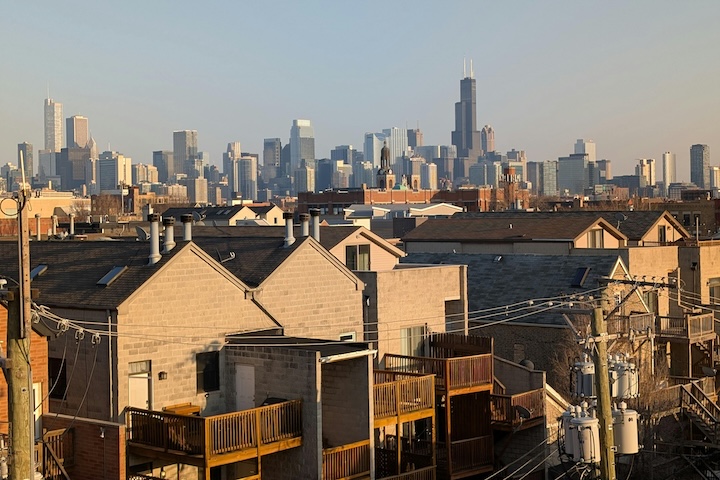
Housing
After adjusting for income and other factors, Black applicants are 2.1 times more likely to be denied a mortgage than white applicants with similar profiles. (National Mortgage Professional)
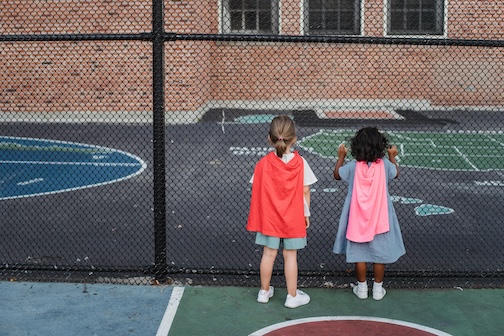
Education
Schools in predominantly minority neighborhoods often receive less funding, resulting in lower-quality facilities and resources.
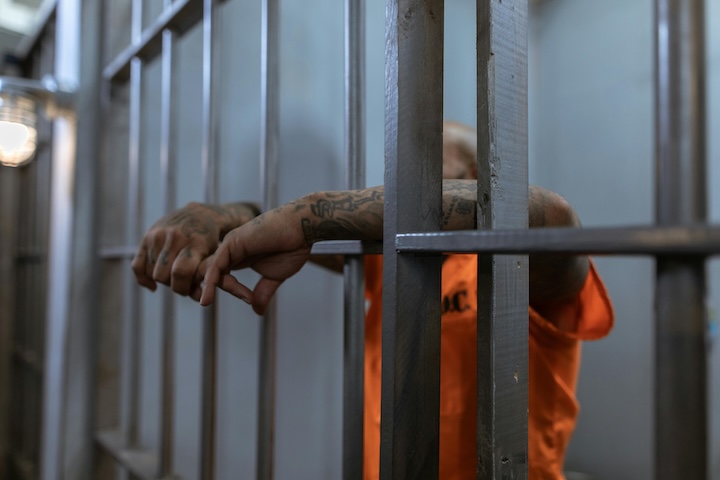
Criminal Justice
Race-based sentencing differences persist across demographic groups. (United States Sentencing Commission)
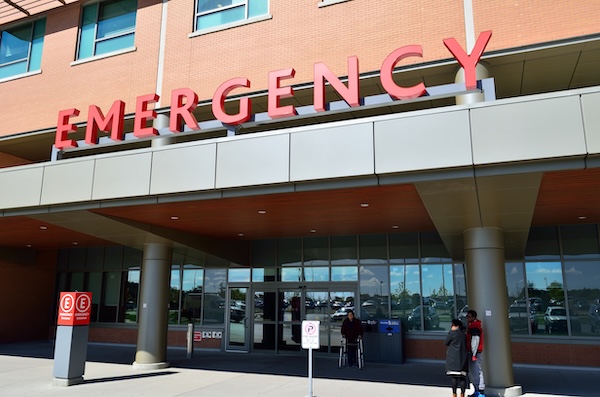
Healthcare
In 2023, Black maternal mortality was 3.5 times higher than that of White women. (National Center for Health Statistics)
These disparities are not accidents—they reflect systems that, whether by design or neglect, perpetuate inequality. Catholic Social Teaching offers both a moral framework for understanding why this matters and a path toward justice.
Institutional Racism and CST
Catholic Social Teaching calls us to more than awareness; it calls us to build institutions rooted in the principles of CST. As the Church teaches, all “forms of discrimination must be firmly opposed.” (The Church and Racism, 33)
Human Dignity: Every person is created in the image of God. (Gen 1:27) Any system that advantages or disadvantages people based on race denies this truth.
Solidarity: We are one human family. CST calls for active participation in dismantling unjust structures and building communities of belonging and inclusion.
Subsidiarity: Every level of society shares responsibility for ensuring that institutions serve the integral good of the whole human family.
Implementing these principles advances the Common Good, which institutional racism gravely undermines by fracturing social unity and distorting justice.
Read More
Our response, therefore, must be both moral and practical: renewing hearts while reforming structures.
Yet, as the Church reminds us, this renewal does not mean erasing difference:
“[T]his does not mean erasing cultural differences. Instead, it is important to educate to a positive appreciation of the complementary diversity of peoples.” (The Church and Racism, 33)
Institutional Racism and CST
Catholic Social Teaching calls us to more than awareness; it calls us to build institutions rooted in the principles of CST. As the Church teaches, all “forms of discrimination must be firmly opposed.” (The Church and Racism, 33)
Human Dignity: Every person is created in the image of God. (Gen 1:27) Any system that advantages or disadvantages people based on race denies this truth.
Solidarity: We are one human family. CST calls for active participation in dismantling unjust structures and building communities of belonging and inclusion.
Subsidiarity: Every level of society shares responsibility for ensuring that institutions serve the integral good of the whole human family.
Implementing these principles advances the Common Good, which institutional racism gravely undermines by fracturing social unity and distorting justice.
Read More
Our response, therefore, must be both moral and practical: renewing hearts while reforming structures.
Yet, as the Church reminds us, this renewal does not mean erasing difference:
“[T]his does not mean erasing cultural differences. Instead, it is important to educate to a positive appreciation of the complementary diversity of peoples.” (The Church and Racism, 33)
How We Can End Institutional Racism
Ending institutional racism is a complex and long-term challenge requiring both personal conversion and structural reform. It demands sustained, coordinated effort to dismantle biased systems while building equitable alternatives rooted in human dignity and solidarity.

Structural Reform: Converting Systems
“A change of structures is linked to a change of hearts.” (Pope St. John Paul II, 2)
Structural conversion begins by replacing policies and practices that produce unequal outcomes with those that promote justice and inclusion. This process must be data-informed, guided by those most affected, and grounded in accountability.
Some examples would include equitable school funding formulas, enforcement of fair lending laws, diversifying hiring practices with accountability metrics, and implementing sentencing reform that addresses disparate outcomes.
No single reform will suffice. Yet evidence-based strategies—drawn from successful policy experiments and long-term studies—offer a roadmap toward equity. What matters most is sustained commitment: continually reviewing laws, institutions, and habits to ensure they serve the common good rather than perpetuate disparity.

Personal Conversion: Converting Hearts
Personal conversion must accompany structural change. Transformation of systems is hollow without the renewal of hearts that sustain them.
Each of us is called to bring the principles of Catholic Social Teaching to life in our own spheres of influence—our parishes, schools, workplaces, and communities. This means examining our assumptions, challenging complacency, and committing to implement and uphold just policies.
As The Church teaches, “persuasion and education must be coupled with the will to translate respect for other ethnic groups into legislation and into the structures and functioning of regional or national institutions”. (The Church and Racism, 33)
Some examples would include advocating for affordable housing, supporting local organizations led by affected communities, and voting for candidates committed to true reform.
The Church “preaches love. She patiently prepares a change in mentality without which structural changes would be in vain”. (The Church and Racism, 27)
Read More
“Since reconciliation is at the heart of the Gospel, Christians cannot accept structures of racial discrimination which violate human rights.” (Pope St. John Paul II, 2)
Profound spiritual preparation must be translated into courageous personal accountability.
This work is hard. It requires examining institutions we benefit from, admitting complicity in systems we didn’t create, and sustaining effort beyond initial enthusiasm. Yet as Christians, we are called to work toward justice even when the path is long and difficult.
Reconciliation – The Gospel Path
“Charity cannot take the place of justice that has been denied; nor can justice…replace charity that has been refused”.
Pope Benedict XVI
True peace requires both. Lasting justice requires reconciliation.
“[S]tructures and processes will not be enough to build a lasting peace; only the path of forgiveness will make this possible”: (The Church and Racism, 10)
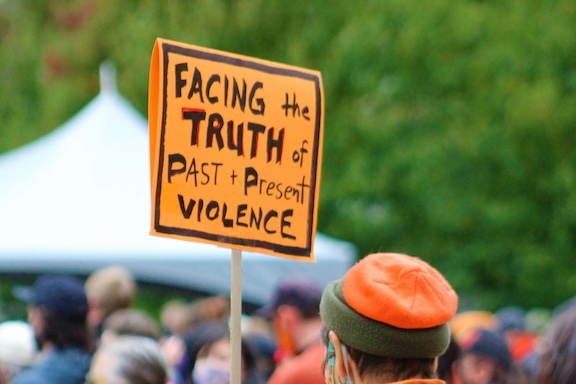
Forgive
Forgive the wounds of the past. Acknowledge slavery, Jim Crow, redlining, mass incarceration. Forgiveness is not forgetting, but truth-telling – making healing possible.

Repair
Repair through just policies. Implement targeted remedies that address documented harms: Invest in disinvested communities, equitably fund schools, reform sentencing, enforce anti-discrimination laws.
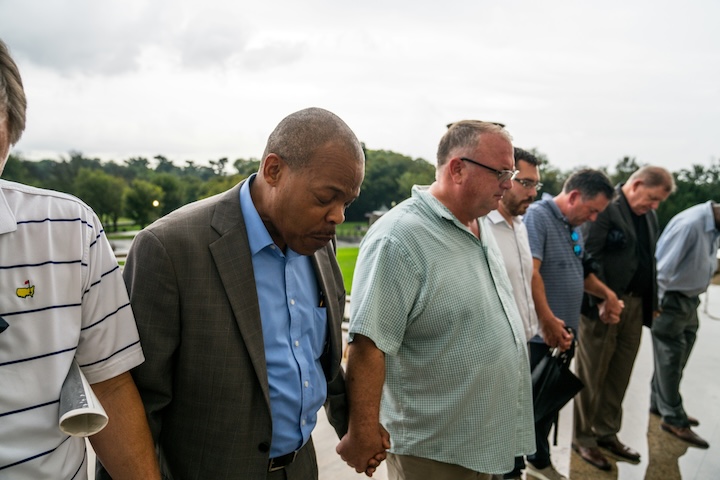
Rebuild
Rebuild trust. Form equal partnerships across racial lines in parishes, schools, neighborhoods—collaborating on shared work, learning from each other’s experience. Demonstrate through sustained action that justice and solidarity are not just aspirations but commitments being lived out daily.
“No process of peace can ever begin unless an attitude of sincere forgiveness takes root in human hearts.”
Pope St. John Paul II, 1

The Way Forward
The challenge of institutional racism—policies and practices that systematically deny opportunity based on race—is not merely a question of bad laws or personal bias. It is a structure of sin that distorts the social order, fractures human solidarity and denies the equal dignity of every person made in the image of God.
Dismantling a systemic problem requires systemic solutions. Ending institutional racism demands a dual commitment:
- Sustained Structural Change—Reforming Systems: We must align our institutions and policies with justice, replacing systems that perpetuate inequity with those that promote human flourishing and the common good.
- Personal Conversion — Renewing Hearts: Structural reform will remain hollow unless it is animated by a conversion of heart. True solidarity demands the courage to translate respect for others into concrete, sustained action.
Ultimately, the call to end institutional racism is a mission of reconciliation. It asks us to repair the wounds of the past and to build a future where every institution reflects the Gospel truth that every life possesses equal and infinite worth.
This synthesis of conviction and action—of reformed structures and renewed hearts—is the path toward a society that truly honors human dignity, justice and the common good.





















